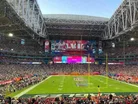Tackling Super Bowl LIX's Scope 3 Emissions Challenge

As New Orleans prepared to host Super Bowl LIX, the NFL faced a significant challenge in managing Scope 3 emissions—the indirect carbon footprint associated with travel, accommodation and consumption. With more than 125,000 visitors expected, these emissions will likely far exceed the NFL's direct operational impact.
The NFL acknowledges the importance of sustainability, stating: "Sustainability is a core focus for the NFL and the league is committed to reducing the environmental impact at each of our events."
However, addressing Scope 3 emissions remains a complex issue, particularly in a city as vulnerable to climate change as New Orleans.
Key Scope 3 Emission sources at Super Bowl LIX
Travel emissions: Flights, particularly private jets used by celebrities and car travel for fans contribute significantly to the event's carbon footprint. Transportation remains one of the largest sources of emissions for large-scale sporting events.
Accommodation: The influx of hotel visitors and short-term rentals increases energy consumption and waste generation, adding to the environmental impact.
Food and Beverage: Large-scale food production, transportation and waste disposal contribute heavily to emissions. The sheer volume of food and drink consumed during Super Bowl week amplifies the carbon footprint.
Advertising: High-profile advertisements, including the renowned US$7m 30-second Super Bowl commercials, carry a significant but often-overlooked carbon footprint due to production and broadcasting processes.
NFL initiatives to mitigate Scope 3 emissions
Coastal Restoration and Carbon Sequestration
Through its NFL Green program, the league collaborates with local organisations to establish a living shoreline using oyster shells. The project helps combat coastal erosion while acting as a carbon sink.
As part of this initiative, the NFL collects "more than 50 tonnes of bagged oyster shells" and plants "thousands of marsh grasses" to sequester carbon and offset emissions.
Urban greening and reforestation
The league is investing in tree-planting initiatives to support long-term carbon sequestration. Efforts such as the commitment to "plant 600 tree saplings" near the Tchefuncte Lighthouse will help offset some of the event's carbon footprint.
Waste reduction and circular economy
The NFL is integrating circular economy principles to reduce waste-related emissions. Recycling and repurposing materials will play a key role in minimising landfill contributions. Notably, "glass recycled on Super Bowl LIX game day will be used to create sand for coastal erosion in Southern Louisiana."
Sustainable food practices
Sustainable food initiatives extend beyond sourcing to waste management. The NFL is leveraging oyster-themed events to promote responsible food consumption while repurposing discarded oyster shells for environmental restoration efforts.
Future considerations for reducing Scope 3 Emissions
While the NFL's initiatives are commendable, fully addressing Scope 3 emissions requires broader systemic changes. Future strategies may include:
- Incentivising low-carbon travel: Encouraging the use of electric or hybrid transportation, increasing public transit accessibility and supporting carbon-offset programs for air travel.
- Expanding plant-based menu options: A shift towards plant-based food choices could significantly reduce meat and dairy production emissions.
- Supplier engagement: Collaborating with vendors and sponsors to adopt more sustainable sourcing and packaging practices throughout the value chain.
The NFL's sustainability efforts align with its broader commitment: "The NFL strives to not only make each Super Bowl more sustainable than the last but to also leave a lasting 'green legacy' in the host's community." However, tackling Scope 3 emissions on a large scale will require continuous innovation, collaboration and a commitment to sustainability beyond the game itself.
Make sure you check out the latest industry news and insights at Scope 3 Magazine and be part of the conversation at our global conference series, Sustainability LIVE and Procurement & Supply Chain LIVE.
Discover all our upcoming events and secure your tickets today. Subscribe to the Scope 3 Magazine newsletter.
Scope 3 Magazine is a BizClik brand.

